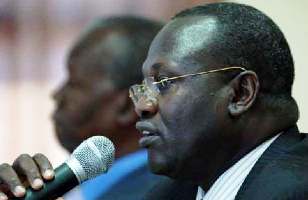“Don’t politicize civil service,” Machar cautions top civil servants in South
September 19, 2010 (JUBA) — Top civil servants in Southern Sudan have been
cautioned on the risk of destroying the civil service system in the region
unless they distance themselves from trying to politicize it.

their respective Directors General from the ten states of the semi-autonomous
region were called to Juba on Friday for a preparatory workshop on the future of civil service in the post-referendum Southern Sudan.
The gathering dwelled on enlightening the states on the functions and responsibilities of the newly established state ministries of Labor, Public Service and Human Resources Development which came into being after the April elections.
The meeting was organized by the Government of Southern Sudan (GoSS) ministry of Labor and Public Service and its newly split twin ministry of Human Resources Development in collaboration with the United Nations Development Program (UNDP).
In his opening key note speech, Vice President Dr. Riek Machar, stressed the
importance of developing the civil service and upholding its criteria on
qualifications in occupying and obtaining jobs in the service. He told the top
civil servants in the states that unlike obtaining positions of constitutional
post holders in which anybody can easily qualify to be a politician, civil
service employments require that one has an academic qualification or experience in order to occupy a certain position in the civil service because it is the machinery that runs the government.
He cautioned against employing people who have no qualifications or experiences in higher grades, warning it would destroy the needed function of the civil service in the region. “Don’t politicize civil service because it will die,” he cautioned.
Machar also told the state governments on the importance of appreciating their
state employees so that they don’t lose their best civil servants to GoSS in
Juba. The Vice President who also holds a PhD in Strategic Planning in Industry,
said having a higher academic qualification doesn’t necessarily mean that one
has to work with GoSS in Juba in order to feel some recognition.
“People should not think that if you have a Masters and PhD you should work at
GoSS. Even those who hold Masters and PhDs can work at the County level,” he
said, adding that if they get appreciation they deserve in the states their
impact can produce good civil service results at the levels of states and
counties.
The Vice President said a federal system of governance, which the South had
longed for since 1947, cannot be successfully achieved unless the region
empowers lower levels of government. Since 1947 Southern Sudan had been calling
for federalism, he said, adding that the North wrongly equated it with
separation until recently in 1994 when federalism was finally accepted and
introduced in Sudan.
He stressed the importance of successfully implementing the system and change
the mindset inculcated in the minds of people through the long time of unitary
system in the country since independence.
Machar explained on preparatory activities by the ruling Sudan People’s
Liberation Movement (SPLM) on would be federalism in Southern Sudan even before
the signing of the Comprehensive Peace Agreement (CPA) in 2005. The first
preparatory workshop by SPLM in the Kenyan capital, Nairobi, shortly before the
signing of the CPA, which he said he happened to chair, was a “defining”
exercise because it involved political, administrative and fiscal
decentralization.
Machar who appreciated that preparatory exercise said by then some of the
participants came from background of unitary school while others from federalist
school of thought. He further explained that a consensus was however reached to
further implement the system of decentralization despite the fact that the
matter was complicated by some of those that came from federalist school that
were previously exposed to serving under a unitary system of governance in Sudan
and had to present pro-unitary views.
He said the post-referendum Southern Sudan should prepare to successfully
implement a decentralized system of governance in the region, not only in
political decentralization but also in all its aspects including the
administrative as well as fiscal decentralization.
The Vice President also stressed the importance of providing capacity building
or trainings to civil service staffs at all levels of government, adding that
investing resources in training civil servants would not be seen as a waste of
resources.
He warned that the coming period may witness emergence of a strong private
sector in Southern Sudan that will be competing with the government over
recruitment of workforce, hence the need for training and appreciation of
employees.
He also advised the state governments to give attention to labor movements in
their respective states with the aim to dialogue with them in pressing for their
rights, adding that such dialogues are important because they minimize the risk
of resorting to strikes by employees.
Southern Sudan has been struggling to put its civil service machinery right as
the region has been unfortunately experiencing numerous irregularities in the
civil service sector that range from ghost names, employment of unqualified and
inexperienced staffs in higher grades, in which a student, for example, “is
given a higher grade than his current teacher” in some cases, as well as
duplications in employment in which an employee is employed in more than one
government institutions.
(ST)
